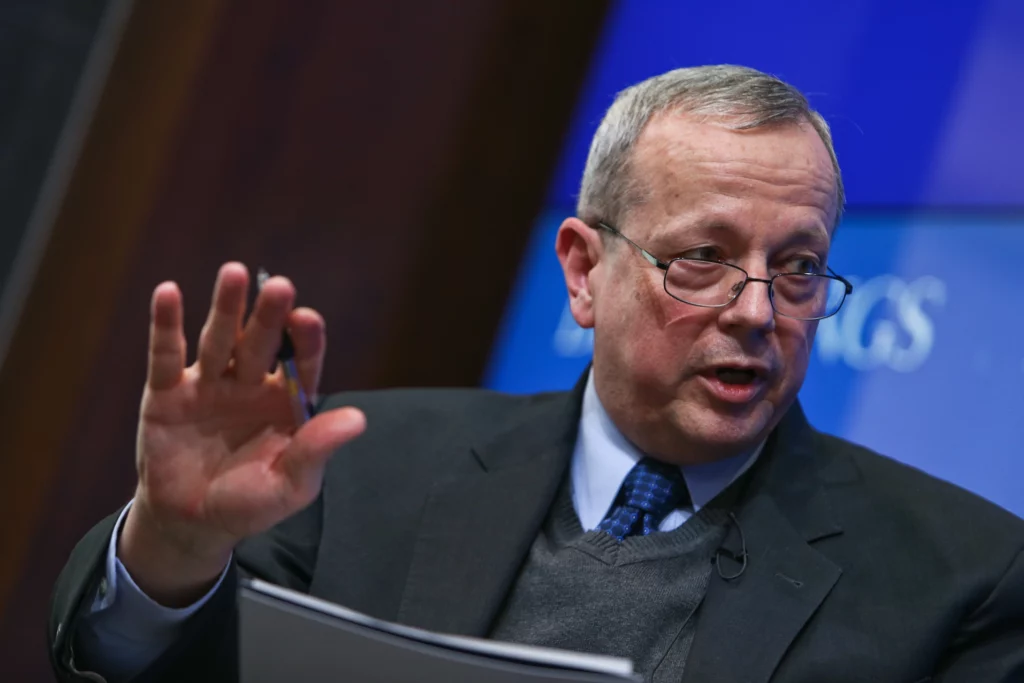John Allen, Illegal Lobbying, and Foreign Influence
The retired general and think tank president is in hot water.

The president of the Brookings Institution, retired Marine four-star general John Allen, has been suspended because he’s under investigation
AP (“Brookings places retired general on leave amid FBI probe“):
The prestigious Brookings Institution placed its president, retired four-star Marine Gen. John Allen, on administrative leave Wednesday amid a federal investigation into his role in an illegal lobbying campaign on behalf of the wealthy Persian Gulf nation of Qatar.
Brookings’ announcement came a day after The Associated Press reported on new court filings that show the FBI recently seized Allen’s electronic data as part of the probe and detailed his behind-the scenes efforts to help Qatar influence U.S. policy in 2017 when a diplomatic crisis erupted between the gas-rich monarchy and its neighbors.
Allen, who led U.S. and NATO forces in Afghanistan before being tapped to lead Brookings in late 2017, has not been charged with any crimes. His spokesman, Beau Phillips, said Wednesday that Allen had done nothing improper or unlawful.
“Through decades of public service in combat and diplomacy, General Allen has earned an unmatched, sterling reputation for honor and integrity,” Phillips said in a statement. “We look forward to correcting the falsehoods about General Allen that have been improperly publicized in this matter.”
Brookings told staffers in an email Wednesday that the institute itself is not under investigation and that the think tank’s executive vice president, Ted Gayer, will serve as acting president.
“We have every confidence in the Brookings team’s ability to remain focused on delivering quality, independence, and impact,” the email said.
Brookings pays Allen more than $1 million a year, according to its most recently available tax records. The email to staff did not say whether Allen would continue to be paid while on leave.
The federal investigation involving Allen has already ensnared Richard G. Olson, a former ambassador to the United Arab Emirates and Pakistan who pleaded guilty to federal charges last week, and Imaad Zuberi, a prolific political donor now serving a 12-year prison sentence on corruption charges. Several members of Congress have also been interviewed.
An FBI agent said in an affidavit in support of a search warrant there was “substantial evidence” that Allen had knowingly broken a foreign lobbying law, and had made false statements and withheld “incriminating” documents.
Allen’s behind-the-scenes work involved traveling to Qatar and meeting with the country’s top officials to offer them advice on how to influence U.S. policy, as well as promoting Qatar’s point of view to top White House officials and Congress, according to the FBI affidavit.
The Qatar Embassy did not immediately respond to a request for comment.
Brookings is one of the most influential think thanks in the U.S. and has long had strong ties to Qatar. In 2007, the Qatari Ministry of Foreign Affairs agreed to fund a Brookings-backed offshoot in Qatar called the Brookings Doha Center.
The Qatari government said in a 2012 news release that the center’s role included “reflecting the bright image of Qatar in the international media, especially the American ones,” according to a New York Times report that showed Qatar had given Brookings $14.4 million in donations over a four-year span.
Most of the reporting on this yesterday featured Allen in his general’s uniform but the allegations against him all stem from his post-retirement lobbying. AP’s earlier report (“FBI seizes retired general’s data related to Qatar lobbying“) was damning:
The FBI has seized the electronic data of a retired four-star general who authorities say made false statements and withheld “incriminating” documents about his role in an illegal foreign lobbying campaign on behalf of the wealthy Persian Gulf nation of Qatar.
[…]
The court filings detail Allen’s behind-the scenes efforts to help Qatar influence U.S. policy in 2017 when a diplomatic crisis erupted between the gas-rich Persian Gulf monarchy and its neighbors.
“There is substantial evidence that these FARA violations were willful,” FBI agent Babak Adib wrote in a search warrant application, referring to the Foreign Agents Registration Act.
[…]
Allen also misrepresented his role in the lobbying campaign to U.S. officials, Adib wrote, and failed to disclose “that he was simultaneously pursuing multimillion-dollar business deals with the government of Qatar.”
The FBI says Allen gave a “false version of events” about his work for Qatar during a 2020 interview with law enforcement officials and failed to produce relevant email messages in response to an earlier grand jury subpoena.
The 77-page search warrant application appears to have been filed in error and was removed from the docket Tuesday after The Associated Press reached out to federal authorities about its contents.
Allen declined to comment on the new filings. He has previously denied ever working as a Qatari agent and said his efforts on Qatar in 2017 were motivated to prevent a war from breaking out in the Gulf that would put U.S. troops at risk.
Allen spokesperson Beau Phillips told AP last week that Allen “voluntarily cooperated with the government’s investigation into this matter.”
Allen, who was a senior fellow at the Brookings Institution prior to becoming president, used his official email account at the think tank for some of his Qatar-related communications, the affidavit says.
Brookings did not immediately respond to a request for comment. Qatar has long been one of Brookings’ biggest financial backers, though the institution says it has recently stopped taking Qatari funding.
Olson was working with Zuberi on another matter involving Qatar in mid-2017 when Saudi Arabia, the United Arab Emirates and other Gulf countries announced a blockade of Qatar over its alleged ties to terror groups and other issues.
Shortly after the blockade was announced, then-President Donald Trump appeared to side against Qatar.
The court papers say Allen played an important role in shifting the U.S.’s response. Specifically, authorities say Allen lobbied then-National Security Advisor H.R. McMaster to have the Trump administration adopt more Qatar-friendly tone.
In an email to McMaster, Allen said the Qataris wanted the White House or State Department to issue a statement with language calling on all sides of the Gulf diplomatic crisis to “act with restraint.”
Federal law enforcement officials say then-Secretary of State Rex Tillerson did just that two days later, issuing a statement that called on other Gulf countries to “ease the blockade against Qatar” and asked “that there be no further escalation by the parties in the region.”
NYT (“Retired General Investigated Over Undisclosed Lobbying for Qatar“) adds:
Federal prosecutors have obtained records indicating that John R. Allen, the retired four-star Marine general who commanded all American troops in Afghanistan and now heads a venerable Washington think tank, secretly lobbied for the government of Qatar, lied to investigators about his role and tried to withhold evidence sought by a federal subpoena, according to court documents.
[…]
Federal law requires that anyone lobbying for a foreign government register with the Justice Department. The department has been cracking down in recent years on violations of the Foreign Agents Registration Act, or FARA. There is no record of General Allen registering to lobby for Qatar.
[…]
Federal law requires that anyone lobbying for a foreign government register with the Justice Department. The department has been cracking down in recent years on violations of the Foreign Agents Registration Act, or FARA. There is no record of General Allen registering to lobby for Qatar.
[…]
The plan described in the documents involving General Allen unfolded around the beginning of the Trump administration five years ago, after he had left the military and before he became president of the Brookings Institution think tank. Qatar was frantically trying to fend off a pressure campaign and economic embargo by its Persian Gulf rivals, Saudi Arabia and the United Arab Emirates. Rumors were circulating of a possible Saudi ground invasion, Mr. Trump appeared to back the Saudis and Emiratis, and both sides of the dispute were spending heavily to win favor in Washington.
Mr. Zuberi, according to the filing, “viewed the diplomatic crisis as a business opportunity” and began conspiring to sell lobbying services to Qatar. He contacted Mr. Olson, who had recently left government. Mr. Olson in turn brought in General Allen, according to the filing.
“If we can do this we will own half of Qatar,” Mr. Zuberi wrote to Mr. Olson in a WhatsApp message cited in the filing about their proposed plan with General Allen.
The court document gives a detailed account of several weeks in June 2017 when General Allen was recruited by Mr. Olson and Mr. Zuberi to meet with top Qatari and American officials to diffuse the Gulf crisis — and how General Allen saw the money making potential for his involvement.
The document states that he agreed to travel to Doha, the Qatari capital, at Mr. Zuberi’s expense and negotiated a payment of $20,000, which he referred to as a “speaker’s fee.” The document quotes one message from General Allen showing his aim of making more money down the road — to “work out a fuller arrangement of a longer term relationship.”
Other messages cited in the document show that General Allen pursued other business with firms affiliated with Qatar, one of which would have provided him with a commission of over $1 million. The document said the F.B.I. has not determined whether he received this money.
Let’s stipulate that we have only one side of the story and only part of it at that. We have the detailed FBI warrant application, which was apparently supposed to be sealed, in an incomplete investigation. Allen has not been charged with a crime.
Still, we have yet another example of two somewhat interrelated phenomena: former senior government officials cashing in on their influence as lobbyists and the seedy side of the ideas industry.
Allen is a retired four-star general with nearly 38 years of service. His pension is in the neighborhood of a quarter-million dollars a year. He’s making another million a year as president of Brookings. (I don’t know what Brookings was paying him at the time of the alleged lobbying, likely considerably less.) He was sitting on multiple boards solely to lend the prestige of his former rank. He was, to say the least, comfortable. One would think he could have been more scrupulous in accepting cash from despots but one imagines that it’s hard to turn down boatloads of free money.
Given that retired generals receive a massive pension for life, it seems reasonable to me that we should more severely limit than we do their ability to cash in. It’s one thing to exploit the expertise gained over a decades-long career. It’s another, entirely, to exploit the prestige of the office and, especially, the connections to former subordinates.
As to Brookings, it appears that their hands are more-or-less clean in this particular situation. But, like most DC think tanks, they depend on raking in massive amounts of money from donors and benefactors on an annual basis to stay afloat. And, increasingly, the easiest way to do that is to curry favor with foreign governments and corporations that don’t comply with Western anti-corruption practices. This lends the prestige of the institutions to dubious causes and inevitably taints their research.






The reason we’re unlikely to get serious lobbying reform is that members of Congress don’t want to limit their own ability to “cash in” after leaving office.
Since Manafort’s conviction, the DoJ seems to be on a spree in pursuing cases of unregistered foreign agents. That it appears that they are picking low hanging fruit, breaking that law appears to be an epidemic.
Except for those who are explicitly hanging out the shingle, ‘influencer for hire,’ these retired government officials want the money, but don’t want to sully their reputation by being affiliated with foreign governments. Can’t have it both ways.
@Dave Schuler: If that was the issue, Congress would simply carve out an exemption for themselves as they have with insider trading and relationships with subordinates (Congressional pages). They care about all those at the top of the food chain enough to not exclude the others.
I was under the impression that to work for a foreign government, even non-lobbying work, military retirees (not sure if applies to all federal retirees) have to obtain permission from the State Department. Although probably a minor issue with the more serious allegations here… I am thinking back to my government work days and recall that in briefings for retiring senior military officers / SES civilians about post- service employment / positions, this was a subject of the briefing. I can’t imagine he had no knowledge of any rules / laws in place. In my (small) experience I hadn’t seen a retired GO or even O-6 who didn’t receive one of these briefings b/c of all the potential conflicts of interest that can come up. I also can’t imagine he did not see the news on Manafort and others caught doing this to know he shouldn’t be doing it.
Are there any conservatives not on a foreign government’s payroll at this point? (Also, Ron DeSantis’s spokesperson is an unregistered agent of Georgia — the country, not the state, although the state would be so much funnier)
Why on earth would he do this? I understand the lobbying for money, but the lying to investigators and withholding evidence when caught makes no sense.
Did his lobbying involve something illegal that he wanted to hide? It doesn’t seem like it. Profiting from efforts to thwart a war isn’t exactly boy scout behavior, but why commit crimes to hide it?
I am confusion, America explain.